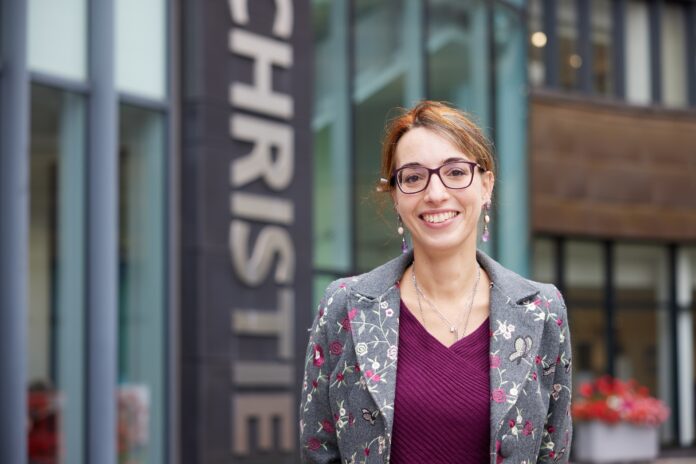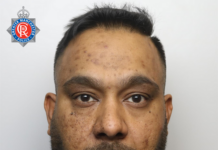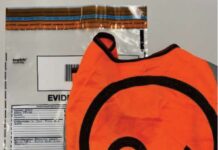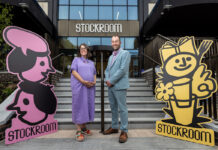Three of the brightest minds in cancer research – Dr Sara Valpione, Dr Emma Searle, and Mr Paul Sutton – are at the forefront of The Christie Charity’s latest fundraising appeal, championing groundbreaking studies and trials that are shaping the future of cancer treatment.
The three pioneering researchers are all based at Manchester’s Paterson building, a research centre that is home to some of the UK’s leading cancer researchers and the Cancer Research UK National Biomarker Centre (NBC). Biomarkers are genes, proteins, and other molecules in the body that reveal insights into cancer’s presence, progression, and response to treatment.
Originally from Italy but now living in Manchester, Dr Sara Valpione started at The Christie hospital in Manchester as a clinical research fellow in 2015, She is now a consultant medical oncologist, the clinician in residence at the Cancer Research UK National Biomarker Centre, and a clinical senior lecturer at The University of Manchester. Her research has focused on optimising personalised therapies for upper gastrointestinal cancer (cancer that develops along the digestive tract) patients, striving toward a future where every patient receives a treatment plan tailored to their specific tumour profile. Her research has the potential to improve cancer outcomes, reduce side effects, and provide patients with a better quality of life by moving beyond broad-spectrum treatments like chemotherapy.
“Thanks to The Christie Charity’s support, we’re now closer to achieving the goal of personalised treatment,” Dr Valpione commented. “This funding is essential as we work on new biomarker tests that can diagnose and monitor upper gastrointestinal cancers from a blood sample with greater accuracy, whilst we also personalise treatment for patients. Through applying these findings, we hope to provide faster, more precise diagnoses and deliver therapies that truly meet each patient’s unique needs.”
Her research is supported within the Cancer Research UK National Biomarker Centre (NBC), where specialised facilities enable rapid sample analysis, and where proximity to The Christie hospital results in impactful research synergies, bringing research findings into clinical practice faster than ever before.
Dr Valpione is now working with a team of experts to investigate a promising new immunotherapy technique. Immunotherapy is a type of cancer treatment that helps the body’s own immune system recognise and fight cancer cells more effectively. Unlike traditional treatments like chemotherapy or radiation, which directly target cancer cells, immunotherapy boosts the immune system to attack cancer. The new immunotherapy technique uses RNA (ribonucleic acids – molecules that were first used in medicine for the COVID-19 vaccines) therapeutics, a breakthrough technology that aims to ‘switch on’ immune cells to combat cancer more effectively.
“RNA-based immunotherapy could revolutionise treatment for oesophageal (food pipe) cancer patients,” Dr Valpione adds. “Manchester has one of the highest incidences of this cancer in Europe, and if successful, our research could benefit patients worldwide.”

Dr Emma Searle is the Deputy Medical Director of the National Institute for Health and Care Research (NIHR) Manchester Clinical Research Facility (CRF) and consultant haematologist at The Christie hospital and has a particular interest in the development of new treatments for patients with difficult to treat blood cancers.
Dr Searle – who is from Oxfordshire and now living in Sandbach, Cheshire – previously completed a PhD in cancer drug development. Thanks to The Christie Charity’s support, her role has been transformative in launching a new service that meets the rigorous standards of early-phase trials, which are trials of new drugs often being used for the first time in patients. She regularly works with colleagues based in the Paterson building to take new drugs from the laboratory to patients and then to learn about how they work to fight the cancer.
“The nature of early-phase trials is incredibly demanding, but The Christie Charity’s investment in my post has been critical in making them possible,” Dr Searle explains. “This funding has allowed us to attract complex global trials to the UK – The Christie is the only UK site offering these groundbreaking studies. In haematology we now treat around 60 patients per year who often otherwise have no viable treatment options.”
Dr Searle’s academic research focuses on novel ways to improve treatment responses for blood cancer patients, many of whom are older and face limited curative options. She adds, “The reality of blood cancers is that most of our patients are older, and we don’t have any ways of curing them. So having a good range of tolerable and effective agents is really important for trying to keep patients alive and well as long as possible. In most cases these cancers remain incurable, but my ultimate goal is to help progress treatment to
the point where we can allow patients to achieve a normal life expectancy while remaining on treatment”.

Mr Paul Sutton from Warrington specialises in the management of colorectal cancer, performing open and minimally invasive surgery for primary, advanced, and recurrent cancer, including pelvic exenteration and sacrectomy where the entire contents of the pelvis are removed. Mr Sutton also performs cytoreductive surgery with heated intra-peritoneal chemotherapy (HIPEC) for appendix tumours and colorectal peritoneal metastases, and surgery for neuroendocrine tumours. These are all complex, but well-established, major surgeries to remove organs in the abdomen and peritoneum (transparent membrane which lines the abdominal cavity) in order to remove cancer.
Mr Sutton’s work is focused on combining chemotherapy, radiotherapy, and immunotherapy to improve response to treatment, with the ultimate goal of reducing the need for life-altering surgery. He explains: “We’ve established a project looking at patients with locally advanced rectal cancer who are having total neoadjuvant therapy, which is a combination of chemotherapy and radiotherapy. We’re tracking the changes in the immune system through treatment to see how both the patient and the tumour respond, how their immune system responds, and how we can manipulate that response to try and improve the efficacy of the treatments that they’re undergoing.”
Thanks to funding from The Christie Charity, Mr. Sutton’s team set up a special endoscopy clinic in February 2025 allowing them to carry out more research where biopsies of tumours are needed. This means they can now take on more important studies to improve treatments. “Without the support from The Christie Charity, this simply wouldn’t be possible,” he says. “Its funding is crucial for getting these projects off the ground and making new research happen.”
“We are in a unique position at The Christie to be delivering research which is really impactful, and there’s a number of reasons for that: the cohort of patients that we treat here, the clinical services that are set up, and the links between The Christie Charity, The University of Manchester, and The Christie hospital. The funding means we can provide more accurate monitoring of treatment response and improve outcomes for patients facing major surgery for advanced disease”.

John McGartland, from Stalybridge, was offered the opportunity to go on one of the trials at The Christie. He was diagnosed in 2019 with gastro oesophageal junction cancer after experiencing severe choking episodes and was treated by the Upper GI team at The Christie. The gastro oesophageal junction is where the oesophagus (food pipe) joins the stomach.
He says: “They explained in layman’s terms my diagnosis and I was asked, if accepted, would I be prepared to take part in a research study using immunotherapy. I agreed in a heartbeat. I was accepted, and it gave me hope.”
Thanks to the clinical trial, John – who is retired – is now in remission and has regular check-ups every four months. Reflecting on his journey, John said, “The Christie has meant everything to my wife Kath, my family and me. I was given hope where there wasn’t any and, ultimately, I was cured. The doctors, the staff, the research, and the treatment made it possible.
“Research and innovation are vital in the fight against cancer, but they need additional financial support. The Christie and The Christie Charity gave me back my life, and I don’t have the words to express my gratitude.”
Research such as this is central to The Christie Charity’s commitment to supporting The Christie hospital’s vision of ‘learning from every patient’ and trebling the number of patients participating in research by 2030. Studies have shown that cancer patients treated at research-intensive hospitals have better outcomes than those treated in hospitals with little or no research activity. The Charity has pledged to support and fund this goal with £30m over the next five years with the ultimate aim of bringing tomorrow’s treatments to patients faster.
Any patients interested in taking part in clinical trials should discuss this option with their consultant or GP. Not all patients will fit the criteria for a specific trial. While clinical trials can be successful for some patients, outcomes can vary from case to case. More information about taking part in clinical trials can be found here.







